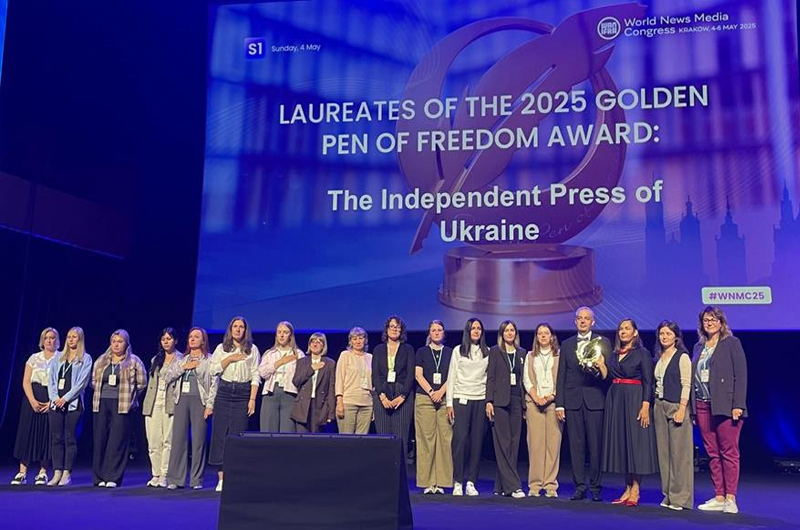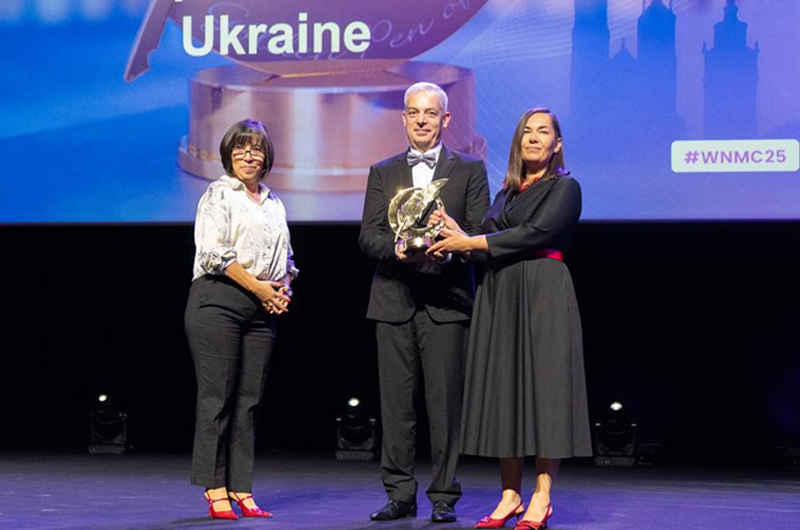The 2025 Golden Pen of Freedom, the annual press freedom award of the World Association of News Publishers, has been given to the Ukrainian independent press
The Golden Pen of Freedom Award, made during the opening ceremony of the 2025 World News Media Congress taking place in Kraków, Poland “recognises the immense sacrifices made by colleagues in the Ukrainian press since the 2022 Russian invasion, and pays tribute to their commitment, professionalism and dedication to upholding the highest standards – in wartime, as in peace.” Accepting the award on behalf of media professionals across Ukraine, Oksana Brovko, CEO of the Association of Regional Press Publishers of Ukraine, and Oleksii Pogorelov, Ukraine Media Business Association President – both WAN-IFRA member associations – underlined the motivation that inspires the independent press to continue its vital work.
“We don’t write because we are brave. We write because silence is not an option,” said Brovko. “Independent journalism is not a luxury – it is the infrastructure of freedom. In Ukraine, we are keeping it alive under fire. This award is not a celebration; it is a responsibility – to keep speaking, especially when silence is safer.”
“Let me convey the gratitude felt by those who work in these extremely difficult times for their audiences, covering both pain and grief,” said Pogorelov. “Those who support the belief that Ukraine will pass the test and be a worthy member of the European and global community of independent countries, that are able to defend democratic values. Those who are having a hard time both morally and physically, but whose professional duty requires them to hold on and not show it.”
Announcing the award, Martha Ramos, editorial director of Organización Editorial Mexicana (OEM) in Mexico, and outgoing president of the World Editors Forum, WAN-IFRA’s community for leading global editors, praised Ukrainian colleagues, “who fully understand this is not a time to waver in our commitment to facts, purpose, and the values that define our democratic aspirations. “This is a time to stand on the right side of history, to back truth, justice and the rule of law – in other words, to keep doing our job as journalists, despite it all.”
Local and regional journalists in Ukraine have tirelessly and courageously reported on the conflict since it began on 24th February 2022. Under constant threat of attack, fighting misinformation, disinformation and Russian propaganda, they also provide citizens with a vital resource of information and – increasingly – connection and community. However, the challenges of wartime reporting remain immense. Newsrooms have been forced to relocate – often multiple times – and journalists with no hostile environment training have been thrust into life-threatening situations, particularly in Russian occupied and frontline areas. At least 16 journalists have been killed since the start of the war. Added to this, the dramatic policy reversals of the new US administration to halt funding to independent media introduce yet another layer of precarity.

The war had already severely disrupted revenue streams, with many media switching to digital-only models in response. Some publications have gone from offering pure news to information on how residents can rebuild their communities left destroyed by the war. But most local and regional publications are operating with virtually no income and heavily rely on donations or help from non-profits. Over 300 independent media have closed since the start of the war – a figure that risks increasing. The impact of the ongoing conflict on news media, and how journalists and newsrooms have adapted to rise above constant threats and challenges, is being documented in scrupulous detail.
The Kiev-based Institute of Mass Information maintains an active Freedom of Speech Barometer, and consistently updates its study of Russia’s war crimes against media in Ukraine, launched on the first day of Russia’s invasion. And in March this year, the National Union of Journalists of Ukraine published From Emergency Measures to Strategic Decisions, comprehensive research that reveals additional critical concerns for media.
“Your support, this recognition, are extremely important. It gives us strength. It confirms that Ukrainian media professionals are not alone. And, of course, you motivate us to continue doing our job and working for Ukrainians. Together, we will win!” affirmed Pogorelov. “In Ukraine, journalism is not just a profession. It is a way to survive, a way to preserve memory, and a way to resist,” said Brovko. “Because when journalists fall silent – the occupiers speak instead.”



 from Webdoux
from Webdoux